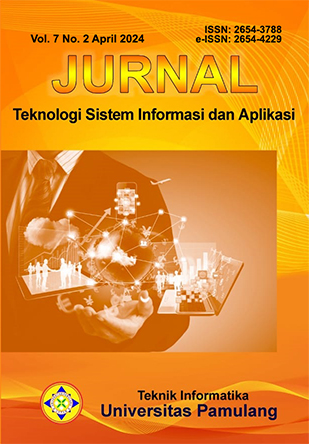Analysis Sentimen Dampak Cyberbullying pada Penggemar K-Pop Melalui Aplikasi Twitter Menggunakan Metode Naïve Bayes
DOI:
https://doi.org/10.32493/jtsi.v7i2.42629Keywords:
K-Pop; Sentimen; Naïve Bayes; CyberbullyingAbstract
Cyberbullying is a violent act committed by someone against another person in an electronic media or the internet. The impact of cyberbullying is that it affects the victim's mentality, not a few victims of bullying end up committing suicide because they cannot stand the pressure of bullying. Korean Pop or better known as K-Pop is starting to dominate the Music Industry in Indonesia today. K-Pop can also be recognized by the emergence of K-Pop fan clubs on social media that provide all information about K-Pop artists to their fans. Indonesia is ranked 3rd with the most tweets about K-Pop. Sentiment analysis in Indonesian is a technique or method used to identify how a sentiment is expressed into a text and how a sentiment can be categorized as a positive or negative sentiment. The method used in this study is the Naïve Bayes Method. In the Naïve Bayes calculation process, the results of this study can be classified as positive, negative and neutral from the opinions of Twitter users.
References
A. S. Putra, H. Ludiya, N. Aisyah and B. S. Prasetyo. Influence of Prices of Goods Anda Promotional Media for E- Commerce Sales Planning Systems. Journal of Innovation Research and Knowledge, vol. 1, no. 3, pp. 249-254, 2021.
Abdurahman, Hidayat, Yani Ahmad, and Rusidi. 2019. Jurnal Teknik Informatika Mahakarya Vol. 2, No.2.
Brogan, C. 2010. Social Media 101: Tactics and Tips to Develop Your Business Online. Hoboken, New Jersey: John Wiley & Sons, Inc.
D. Delen and M. D. Crossland. Seeding the survey and analysis of research literature with text mining. Expert Syst. Appl., vol. 34, no. 3, pp. 1707–1720, 2008
Dzulhaq, M.Iqbal, Rahmat Tullah, Putra Satia Nugraha 2017. Sistem Informasi Akademik Sekolah Berbasis Kurikulum 2013. Jurnal Sisfotek Global Vol.7, No.1.
Hidayatullah, Priyanto, dan Jauhati Khairul K. 2015. Pemrograman Web. Bandung: Informatika Bandung.
Liu. 2011. Sentiment Naliysis and Opinion Mining., Bing Liu Departmen Of Computer Science University III inoise at Chicago.
Mulyani, Sri. 2016. Sistem Informasi Manajemen. Bandung. Abdi Sistematika.
Muslihudin Muhamad., dan Oktavianto. 2016. Analisis dan Perancangan Sistem Informasi Menggunakan Model Terstruktur dan UML. Yogyakarta: CV. Andi Offset.
Nugraini, E. D. 2016. Fanatisme remaja terhadap musik populer korea dalam perspektif psikologi sufistik (studi kasus terhadap EXO-L) (skripsi). Fakultas Ushuluddin UIN Walisongo. Retrieved Mei 6, 2019
O. Rini and S. O. Kunang. Implementasi Data Mining Menggunakan Metode Naive Bayes Untuk Penentuan Penerima Bantuan Program Indonesia Pintar ( Pip ) ( Studi Kasus : Sd Negeri 9 Air Kumbang ). Bina Darma Conf. Comput. Sci., vol. 3, no. 4, pp. 714–722, 2021, [Online]. Available: https://conference.binadarma.ac.id/index.php/B DCCS/article/view/2450
Romney, Marshall B. dan Steinbart. 2015. Sistem Informasi Akuntansi. Edisi 13, alihbahasa: Kikin Sakinah Nur Safira dan Novita Puspasari, Salemba Empat, Jakarta.
Rosa dan Shalahuddin. 2013. Rekayasa Perangkat Lunak (Terstrukur Dan Berorientasi Objek). Informatika Bandung. doi: 10.1209/epl/i2006-10054-4.
Sugiyono. 2017. Metode Penelitian Kuantitatif, Kualitatif, dan R&D. Bandung: Alfabeta, CV.
Sulianta, Feri. 2017. Teknik Perancangan Arsitektur Sistem Informasi. Andi: Yogyakarta.
Vijay, Mr. Sarvesh, 2019. GJRA-Global Journal For Research Analysis. White-Box Testing Technique For Finding Defects, pp.85-83.
Virna Soraya, Wellia Shinta Sari. 2019. Perancangan Enterprise Architecture Sistem Informasi dengan Menggunakan Framework TOGAF ADM pada CV. Garam Cemerlang. Journal of Information System Vol. 4, No. 2, Nopember 2019: 148-156 DOI: 10.33633/joins.v4i2.3054.
Willard, N. 2005. Educator’s guide to cyberbullying and cyberthreats. Journal Research Press, United State.
Zaini. 2018. Dinamika Perkembangan Musik Kpop Dalam Perspektif Industri Budaya. Ppkb.fib.ui.ac.id.
Zufria, Ilka dan M. Hasan Azhari. 2017. Web-Based Applications in Calculation of Family Heritage (Science of Faroidh). Jurnal Sistem Informasi Vol.1 No.1: 2579-5341.
Downloads
Published
How to Cite
Issue
Section
License
Copyright (c) 2024 Shandi Noris

This work is licensed under a Creative Commons Attribution-NonCommercial 4.0 International License.
Authors who publish with this journal agree to the following terms:
- Authors retain copyright and grant the journal right of first publication with the work simultaneously licensed under a Creative Commons Attribution License that allows others to share the work with an acknowledgement of the work's authorship and initial publication in this journal.
- Authors are able to enter into separate, additional contractual arrangements for the non-exclusive distribution of the journal's published version of the work (e.g., post it to an institutional repository or publish it in a book), with an acknowledgement of its initial publication in this journal.
- Authors are permitted and encouraged to post their work online (e.g., in institutional repositories or on their website) prior to and during the submission process, as it can lead to productive exchanges, as well as earlier and greater citation of published work (See The Effect of Open Access).
Jurnal Teknologi Sistem Informasi dan Aplikasi have CC BY-NC or an equivalent license as the optimal license for the publication, distribution, use, and reuse of scholarly work.
In developing strategy and setting priorities, Jurnal Teknologi Sistem Informasi dan Aplikasi recognize that free access is better than priced access, libre access is better than free access, and libre under CC BY-NC or the equivalent is better than libre under more restrictive open licenses. We should achieve what we can when we can. We should not delay achieving free in order to achieve libre, and we should not stop with free when we can achieve libre.
This work is licensed under a Creative Commons Attribution-NonCommercial 4.0 International (CC BY-NC 4.0) License
YOU ARE FREE TO:
- Share - copy and redistribute the material in any medium or format
- Adapt - remix, transform, and build upon the material for any purpose, even commercially.
- The licensor cannot revoke these freedoms as long as you follow the license terms



_2020_-_7(2)_2024_-_Thumbnail.png)












